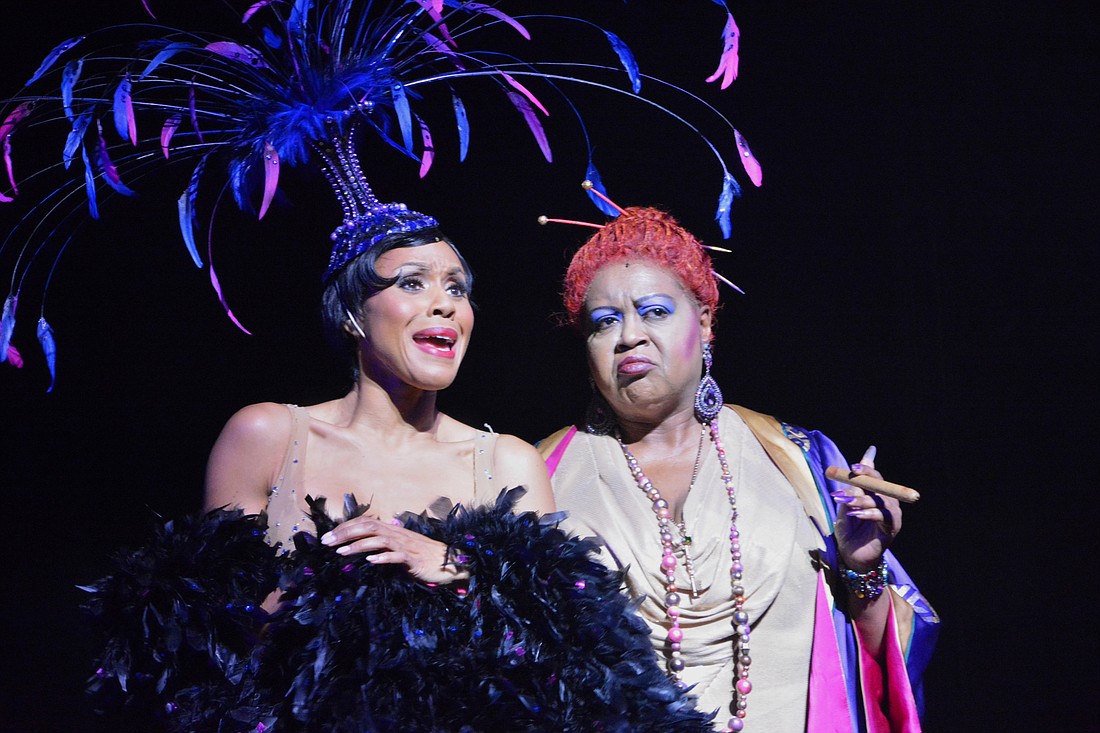- April 26, 2025
-
-
Loading

Loading

Josephine Baker’s life should make great fodder for a Broadway musical. Baker was one of the great entertainers of the 20th century. Married numerous times, she always managed to maintain her independence. She was purportedly photographed more than any superstar of her generation. She worked successfully for the French Resistance. And, having a warm, nurturing side and being unable to bear children of her own, she adopted nearly a dozen orphans.
Making her story even better for the stage than all the plusses in her eventful life, she also had the downsides that make for real theater. She left her lovers, sometimes to her own emotional detriment. Her mother exploded her childhood dreams and tried to instill in her a sense of failure. And her own America never really accepted her into the society, fortune and fame she was able to find in Europe, especially France.
With all this wonderful stage baggage, one would think “Josephine,” the musical, would be a huge success, but the show, which just had its world premiere at the Asolo Repertory Theatre in Sarasota, with dreams of making it big on Broadway, falls short of the blazing spotlights in which it tries so hard to shine.
It’s not from lack of talent. The star-studded, multi-award-winning cast is as strong as any you could want. Deborah Cox, in the title role, is strong, energetic and drop-dead gorgeous.
Kevin Earley, her on-again, off-again friend, confidante and wanna-be lover, Jo Bouillon, makes a perfect foil, as he sings and dances his way from the orchestra, where he’s the Acting conductor (there’s the real conductor, Sinai Tabak, down in the bowels of the pit, whom we don’t meet until the bows at the end), to the stage, where he drifts in and out of Josephine’s rocky life with grace.
Mark Campbell, who plays the roles of both Prince Gustav VI of Sweden, and the notorious Nazi, Hermann Goering, is rich-voiced, and suitably cool or dastardly, depending on the wig he’s wearing at the time.
The young, vivacious Tori Bates is sprightly and buoyant as the young Josephine. She chases her older self around, leaving shadows of her difficult childhood to follow her grown-up twin with an often annoying presence that eventually incorporates into a fully formed, Freudian adult, singing and dancing her way into our hearts like Shirley Temple in a nightmare.
And Michael Keyloun as Sven, with his lover JouJou (Matthew McGee), form a funny, occasionally touching, partnership as the secondary love interest, singing, dancing and prancing through this convoluted cartoon of a show.
Then there’s Lynette DuPree, whose Bricktop just about steals the show with a belting voice and mesmerizing stage presence that take over every moment she’s on stage. And thereby hangs the problem with “Josephine.”
Try as he may, director/choreographer Joey McKneely, who made such a hit with his recent revival of “West Side Story” at the Asolo, just couldn’t quite make a silk purse of this sow’s ear-of-a-show he was given by composer Stephen Dorff, lyricist John Bettis and librettists Ellen Weston and Mark Hampton.
“Josephine” is a caricature of itself. A comic book with pretensions of being a soulful retelling of an important life. And it leaves us with all the gloss and glitz but none of the guts of the heart. Every time we come close to real feelings and emotions, we’re confronted with dancing girls and strutting page boys breaking the tension and mood.
There’s something for everyone in “Josephine.” Too much, in fact. If you’re in the minority, just wait. Your joke will come. Even singers get the brunt of a joust or two: “What do you see when you look up a soprano’s skirt?” we’re asked. “A tenor,” we’re told and not even given time to boo or groan.
Costume designer Eduardo Sicangco is spot-on with a multitude of magnificent gowns but, perhaps in a switch to more modesty from the original nudity Josephine Baker displayed at the Follies Bergére, the imposing dancing girls are encased in mesh body stockings that sag here, gap there and are definitely unglamorous.
Still, the costumes, along with scenic designer Paul Tate dePoo III’s Erte-sculpted sets, are magnificent and worth the price of admission.
Caricature or cartoon, “Josephine” is a musical but here, again, there are problems because, while Steve Orich’s arrangements are deft, Dorff’s songs are distinctly derivative. Every song sounds like something from an old Broadway ghost — “Les Miz,” “Do I Hear a Waltz,” “Carousel,” “Evita,” “A Chorus Line,” “Dream Girls” — all present to entertain us, no matter what the stage situation.
Much like Josephine, the person, “Josephine,” the musical, has its problems, starting with the characters’ lack of real personality. It’s glitzy, glossy entertainment with a great cast, but it needs one important ingredient: soul.